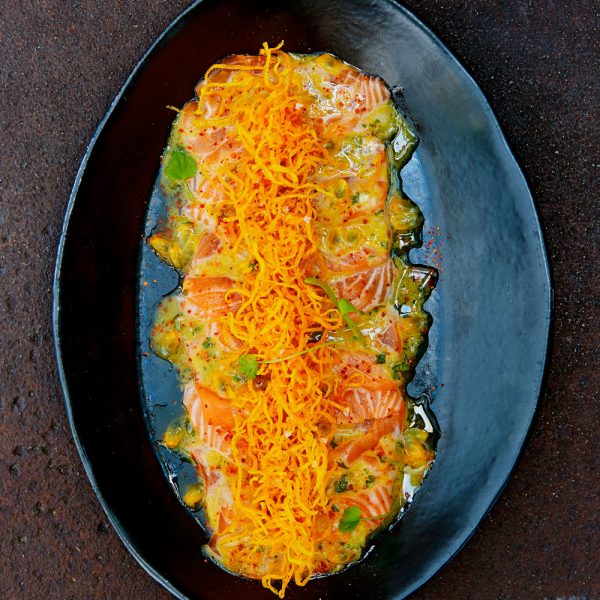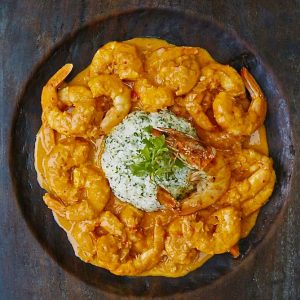
The world is your oyster when it comes to seasoning Tiradito. Much as I love using lime as a major component for Leche de Tigre (the marinate for ceviches and tiraditos), there is a whole range of different fruits to play with. Here, I use passion fruit and aji amarillo (Peruvian yellow chilli) to create a zingy, punchy dressing that works really well with the fatty salmon. Finish the dish with a dusting of fine Espelette pepper for a gentle, fruity hint of chilli.
Ingredients (serves 4):
- 200g sushi-graded salmon fillet, skinned
- 400g sweet potatoes
- Sunflower oil for deep-frying
- a few sprigs of chervil (or coriander)
For the passion fruit Leche de Tigre (Tiger’s Milk):
- 4 small passion fruit, juice and seeds (around 50g in total)
- 1 teaspoon of aji amarillo paste
- 1 lemon, juiced (60ml)
- ¼ teaspoon of salt
- 1 clove garlic, cut
- 1cm slice of ginger
- 1 tbsp mirin
- 1 tbsp sugar
- ¼ banana shallot, very finely chopped
- 2 tbsp of chervil, very finely chopped (or coriander)
- A sprinkle of Espelette pepper (can substitute with sichimi pepper)
- A sprinkle of Maldon salt flakes
Method:
- Make the passion fruit leche de tigre by whizzing all the ingredients (except the shallot and chervil, and 1-2 tablespoons of passion fruit seeds to be reserved for the presentation) in a food processor. Pass it through a fine sieve, add the finely chopped shallot and chervil. Refrigerate until needed.
- Peel the sweet potatoes. Using a zester or preferably a Spiralizer, cut fine strips of potatoes rather like spaghetti. Line a plate with absorbent paper. Add sunflower oil to a pan and heat to 140°C (note – use a deep pan and do not fill more than 1/3 full as the hot oil will rise to the surface as the potato is added). Fry the potato spaghetti for about 1 minute until lightly browned, transfer to the lined plate. The potato strands will not be crispy at this stage but do not worry – we will re-fry them just before serving. Keep the oil hot.
- Remove any residual brown flesh from the salmon fillet. Cut the salmon into thin slices and arrange them in a single row over each of the four serving plates. For each plate, spoon 2 to 3 tablespoons of the passion fruit leche de tigre over the salmon and dot with a few passion fruit seeds around the plate. Let it ‘cook’ for 3 to 5 minutes.
- Meanwhile, quickly re-fry the potato spaghetti for another 30 seconds, drain on kitchen paper and season with fine sea salt.
- When you are ready to serve, arrange a line of crispy sweet potato spaghetti in the middle of the salmon row, and scatter a few sprigs of chervil (or coriander) on the plate. Sprinkle some Maldon sea salt flakes and Espelette pepper. Serve immediately.


